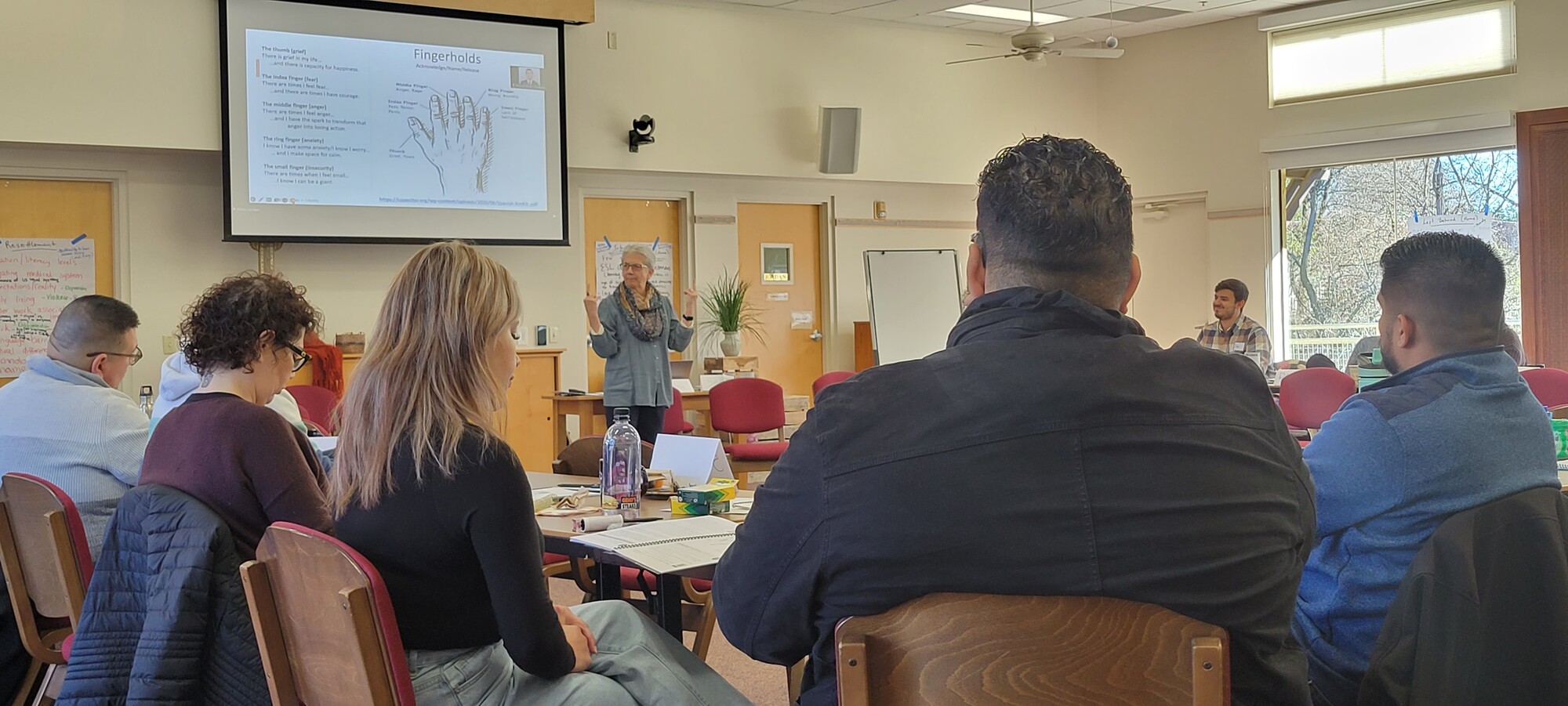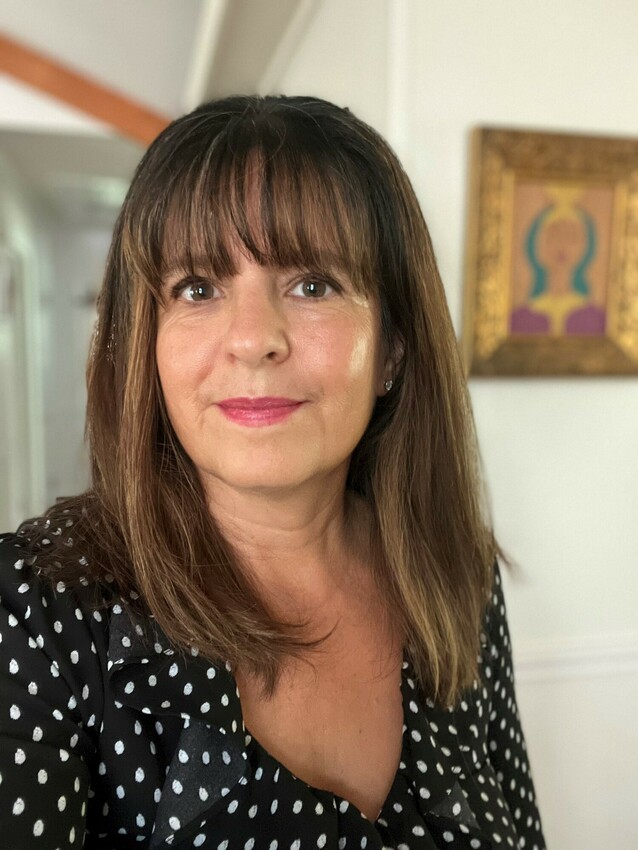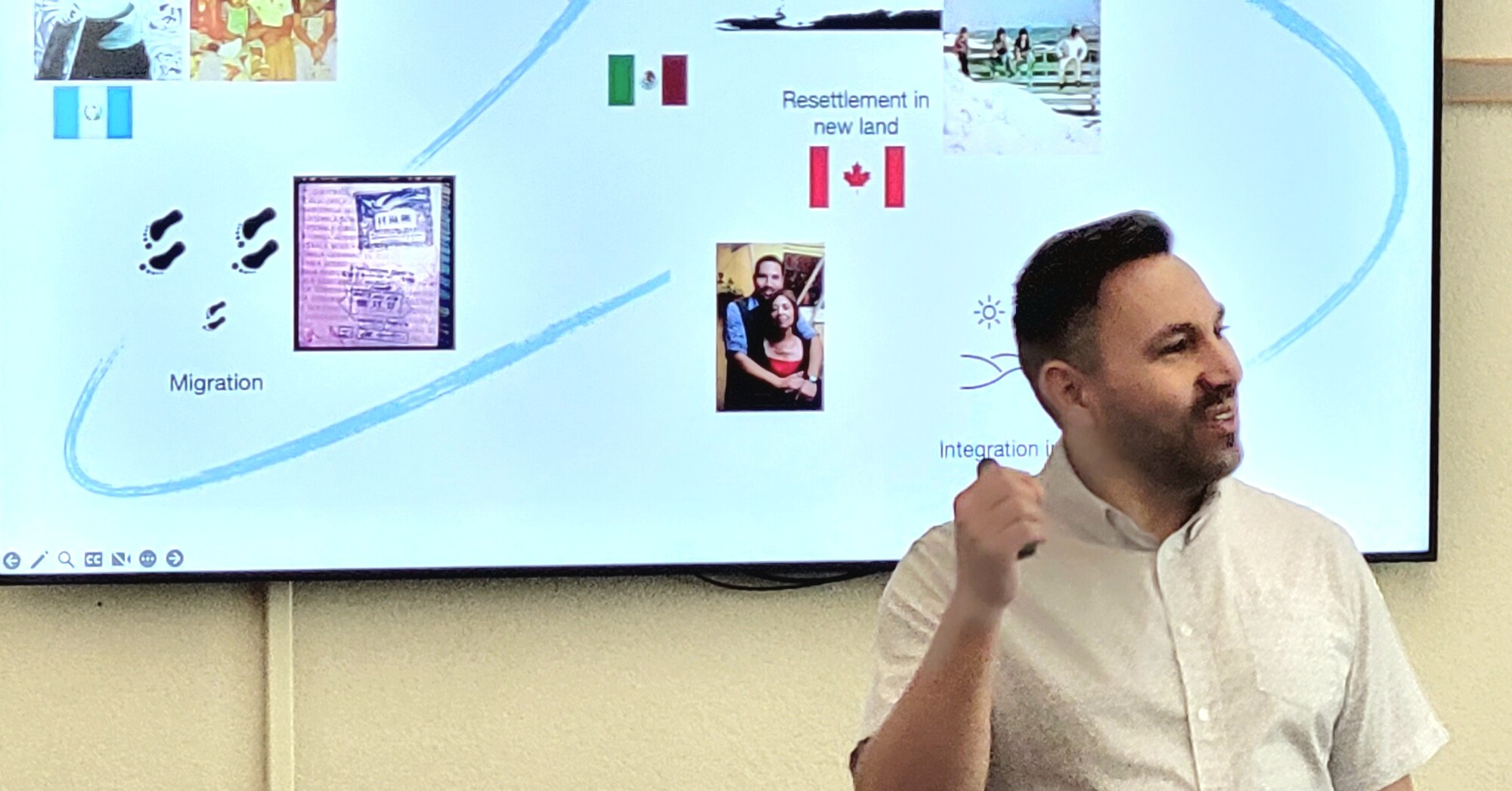Learning to help migrants with trauma

“I left everything, including my career.” Mónica Tornoé vividly remembers the sense of loss she felt after relocating from Guatemala to Austin, Texas, for her husband’s work. Unable to practice law in the U.S., she prayed for a new direction.
Now, as director of Latino education initiatives for Austin Presbyterian Theological Seminary, she often works with migrants who are facing steep barriers as they try to thrive in a new country. She has helped to write their stories so that others can understand their experiences.
In September 2022, she traveled to Mennonite Central Committee (MCC) in Akron, Pennsylvania, for a two-day seminar, Addressing the Impact and Trauma of Migration. She learned more about how to help newcomers heal.
Tornoé says that migrants “deal with so much trauma. They come escaping violence poverty. The journey to get here is so traumatic. ... And then things don’t get better, so things continue to traumatize them.”

Refugees and asylum seekers fleeing dangerous situations often have little space and time and few tools to recover from trauma. And with limited housing and work opportunities, undocumented immigrants may find themselves in exploitative situations. Often, this exploitation goes unreported, for fear that interaction with law enforcement could lead to detention or deportation.
Failure to recognize and address stressors — from loss of cultural identity to perpetual fear of deportation — can lead to harmful behaviors, such as withdrawal from loved ones, substance abuse or a tendency to lash out at others.
Tornoé has found that while host communities are quick to offer newcomers help in the form of food, “Really, we need food for our souls and emotions.”
The seminars, led by Saulo Padilla, MCC’s immigration education coordinator, and independent resilience and trauma educator Elaine (Elena) Zook Barge, help attendees nourish themselves and their communities.
Addressing the impact and trauma of migration
Seminar attendees have included staff from legal organizations, universities, church groups and individuals who accompany children traveling to the U.S. without family.
Like Tornoé, many attendees are themselves immigrants.
Padilla is as well. In the 1980s, his family moved from Guatemala to Canada, after his father was detained and tortured for participating in a protest.
Padilla moved to Goshen, Indiana, for college in 2001, and has worked for MCC since 2008. Trainings he attended on trauma and resilience helped him think about the ways that migration had affected his family — how his father buried himself in work as a distraction, how his mother eventually returned to Guatemala, and how she used pills to numb the pain of their migration and family separation.

He knew others could benefit from similar spaces for reflection and healing. So, he joined with Zook Barge, a retired faculty member and Strategies for Trauma Awareness and Resilience facilitator from Eastern Mennonite University’s Center for Justice and Peacebuilding program, and nonprofit Humanitarian Development Partnerships to develop seminar content. The first event took place in 2020.
Padilla and Zook Barge lead participants through exercises that can help the body regain stasis after traumatic events. Another activity, River of Life, prompts attendees to depict their lives as flowing waterways, with features like rocks and rapids representing trying times. Participants share their drawings in small groups.
“Sharing helps them recognize that we all have those challenging times. Storytelling is something we can do to consider what has happened to us and the resilience factors that got us through those times.”
Saulo Padilla
MCC's Immigration education coordinator
“Sharing helps them recognize that we all have those challenging times,” explains Padilla. “Storytelling is something we can do to consider what has happened to us and the resilience factors that got us through those times.”
Forgiveness is a common theme in the seminar. In one exercise, participants consider the experiences of host communities in the U.S. and Canada, who may themselves be carrying trauma from economic or racial inequality. Padilla explains, “The newcomer comes with a fear of the new community, and the community comes with a fear of the newcomer. That’s where a lot of issues happen.” Addressing the traumas of all involved can be key to reconciliation.
When working with churches, Padilla and Zook Barge weave Scripture into the activities. Padilla says the exercises can become “almost like prayer” for participants.
Those who find themselves needing additional support after the workshop are encouraged to research mental wellness resources available to them, such as their organizations’ employee assistance programs.
A trauma-informed approach to work
Anu Thomas was still in her mother’s womb when her family came to Philadelphia, Pennsylvania, from India. Today, she is the executive director at Esperanza Immigration Legal Services in Philadelphia.

Migrants who contact Esperanza often bring up challenges outside of the organization’s scope, such as heart-wrenching domestic violence situations. Staff are trained to refer these callers to partner organizations.
Thomas says, “If I’m listening to a call, I’m thinking about the legal elements of the claim and I’m doing a plug-and-play process,” an approach that allows her to maintain emotional distance. But she knew these calls stuck with many employees and could result in secondary trauma.
Tornoé was likewise eager to apply seminar content to her outreach efforts. Working with her friend Dianne Garcia, a Mennonite pastor from San Antonio, she produced a series of videos, in English and Spanish, depicting simple trauma-healing activities. (The videos are available partway through the seminary’s Vimeo page, starting with “Ch. 1 – Que es trauma/What is trauma.”)
She plans on continuing to share what she learned, saying she’s still “at the beginning of getting those resources available to the community.” She had already published books of immigrants’ stories, theundocumentedstories.org.
How churches and communities can support migrants
“A lot of characters in the Bible were immigrants,” Tornoé says. She points to passages like Hebrews 13:2 (NRSV) as an impetus for welcoming newcomers. (“Do not neglect to show hospitality to strangers, for by doing that some have entertained angels without knowing it.”)
Thomas says that the Indian Orthodox church her family joined in Philadelphia helped them settle into the U.S. and stay connected to their culture. She adds that churches have a unique opportunity to invite migrants to unite and seek services on-site, regardless of their cultural or religious backgrounds. “I think it could be really, really valuable because people need a lot … right now.”
By approaching such outreach with an awareness of trauma, faith communities are well positioned to make a meaningful impact. To learn more about Addressing the Impact and Trauma of Migration seminars, email Immigration@mcc.org.
Header photo caption: During an Addressing the Impact and Trauma of Migration seminar at MCC’s Akron, Pennsylvania, campus, co-facilitator Elaine (Elena) Zook Barge leads participants through an activity known as “fingerholds,” meant to help the body regain stasis after a traumatic event. Photo courtesy of Saulo Padilla
Mónica's portrait courtesy of Mónica Tornoé
Anu Thomas' photo courtesy of Sarah R. Bloom Photography
Support MCC's work with migrants and refugees
Every donation makes a difference.

